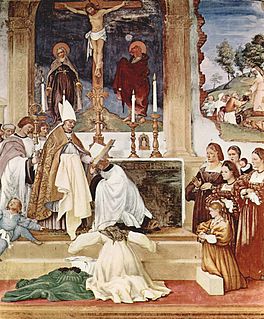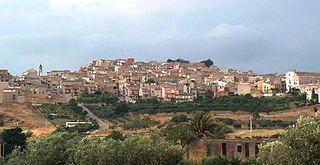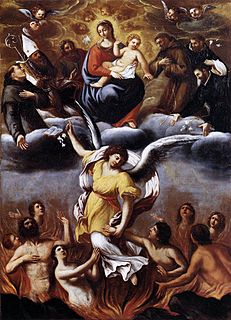
In Christianity, All Souls' Day or the Commemoration of All the Faithful Departed, that is, of the souls of all Christians who have died, follows All Saints' Day. Observing Christians typically remember deceased relatives on the day. In Western Christianity the annual celebration is now held on 1 November and is associated with the season of Allhallowtide, including All Saints' Day and its vigil, Halloween. In the Catholic Church, "the faithful" refers specifically to baptized Catholics; "all souls" commemorates the church penitent of souls in Purgatory, whereas "all saints" commemorates the church triumphant of saints in Heaven. In the liturgical books of the western Catholic Church it is called the Commemoration of All the Faithful Departed, and is celebrated annually on 2 November. In the ordinary form of the Roman Rite, as well as in the Personal Ordinariates established by Benedict XVI for former Anglicans, it remains on 2 November if this date falls on a Sunday; in the 1962−1969 form of the Roman Rite, use of which is still authorized, it is transferred to Monday, 3 November. On this day in particular, Catholics pray for the dead. In the Church of England it is called The Commemoration of the Faithful Departed and is an optional celebration; Anglicans view All Souls' Day as an extension of the observance of All Saints' Day and it serves to "remember those who have died", in connection with the theological doctrines of the resurrection of the body and the Communion of Saints. In the Eastern Orthodox Church and the associated Eastern Catholic Churches, it is celebrated several times during the year and is not associated with the month of November.

The Thirty-nine Articles of Religion are the historically defining statements of doctrines and practices of the Church of England with respect to the controversies of the English Reformation. The Thirty-nine Articles form part of the Book of Common Prayer used by both the Church of England and the Episcopal Church. Several versions are available online.

In the teaching of the Roman Catholic Church, an indulgence is "a way to reduce the amount of punishment one has to undergo for sins". It may reduce the "temporal punishment for sin" after death, in the state or process of purification called Purgatory.

Nicholas of Tolentino, known as the Patron of Holy Souls, was an Italian saint and mystic.

In Christian theology, the Christian Church is traditionally divided into:
Wherever there is a belief in the continued existence of human personality through and after death, religion naturally concerns itself with the relations between the living and the dead. And where the idea of a future judgment or a resurrection of the dead or of purgatory exists, prayers are often offered on behalf of the dead to God.

Purgatorio is the second part of Dante's Divine Comedy, following the Inferno, and preceding the Paradiso. The poem was written in the early 14th century. It is an allegory telling of the climb of Dante up the Mount of Purgatory, guided by the Roman poet Virgil, except for the last four cantos at which point Beatrice takes over as Dante's guide.
The Guild of All Souls is an Anglican devotional society dedicated to prayer for faithful departed Christians. As stated on its website, it is a "devotional society praying for the souls of the Faithful Departed, and teaching the Catholic doctrine of the Communion of Saints."

Cianciana is a comune (municipality) in the Province of Agrigento in the Italian region Sicily, located in the middle valley of the Platani river, about 70 kilometres (43 mi) south of Palermo and about 25 kilometres (16 mi) northwest of Agrigento. The Monte Cammarata, elevation 1,579 metres (5,180 ft) above sea level, part of the Monti Sicani chain, is nearby.

Based on Roman Catholic tradition, the Anima Sola or Lonely Soul is an image depicting a soul in purgatory, popular in Latin America, as well as much of Andalusia, Naples and Palermo.
In some forms of Christian eschatology, the intermediate state or interim state is a person's "intermediate" existence between one's death and the universal resurrection. In addition, there are beliefs in a particular judgment right after death and a general judgement or last judgment after the resurrection.
The Great Conversation is a term describing a supposed phenomenon which some Roman Catholic apologists believe takes place in purgatory. They hold that souls arriving in purgatory after death will naturally converse with each other in an effort to determine where they are and how they got there. The impression is that of a large social gathering in which every participant has much the same questions on his or her mind.
A Catholic funeral is carried out in accordance with the prescribed rites of the Catholic Church. Such funerals are referred to in Catholic canon law as "ecclesiastical funerals" and are dealt with in canons 1176–1185 of the Code of Canon Law, and canons 874–879 of the Code of Canons of the Eastern Churches. In Catholic funerals, the Church seeks firstly to offer the Mass for the benefit of the soul of the deceased so that the temporal effects of sin in Purgatory may be extinguished, and secondly to provide condolence and comfort for the deceased's family and exhort the latter to pray, along with the Church, for the soul of the departed.

The Chaplet of Saint Michael the Archangel, also called the Rosary of the Angels is a chaplet resulting from a reported private revelation by the Archangel Michael to the Portuguese Carmelite nun Antónia d'Astónaco. It was approved by Pope Pius IX in 1851.The Pope created this prayer after a diabolic vision of demons besieging Rome during a mass he held.

The idea of purgatory has roots that date back into antiquity. A sort of proto-purgatory called the "celestial Hades" appears in the writings of Plato and Heraclides Ponticus and in many other pagan writers. This concept is distinguished from the Hades of the underworld described in the works of Homer and Hesiod. In contrast, the celestial Hades was understood as an intermediary place where souls spent an undetermined time after death before either moving on to a higher level of existence or being reincarnated back on earth. Its exact location varied from author to author. Heraclides of Pontus thought it was in the Milky Way; the Academicians, the Stoics, Cicero, Virgil, Plutarch, the Hermetical writings situated it between the Moon and the Earth or around the Moon; while Numenius and the Latin Neoplatonists thought it was located between the sphere of the fixed stars and the Earth.

Marie Martha Chambon was a Roman Catholic nun known for introducing the Rosary of the Holy Wounds.

Purgatory is, according to the belief of some Christians, an intermediate state after physical death for expiatory purification.
The Chiesa delle Anime Sante or Church of the Holy Souls is a Roman Catholic church located on the Piazza F.P. Neglia in the town of Enna in Sicily, Italy.













